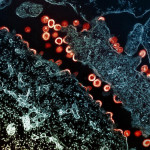People living with HIV should be extra vigilant about the threat of Salmonella poisoning, which has been traced to certain peanut products, according to a February 20 warning issued by the U.S. Food and Drug Administration.
People with impaired immune systems, including those living with HIV/AIDS, are more likely to become severely ill from Salmonella infection than others. When severe infection occurs, Salmonella may spread from the intestines to the bloodstream and can be deadly unless properly treated.
A recall of peanut butter, peanut paste and dry- and oil-roasted peanuts produced by the Peanut Corporation of America (PCA) was announced January 13 and expanded on January 28. After receiving reports of illness and deaths related to Salmonella poisoning, the U.S. Centers for Disease Control and Prevention (CDC) traced the infection source to PCA’s Blakely, Georgia, processing plant.
People infected with Salmonella often develop diarrhea (sometimes bloody), vomiting, fever and abdominal cramps within 12 to 72 hours after infection, with illness ranging from mild to severe. The illness usually lasts four to seven days, and most people recover without treatment. However, people with impaired immune systems—as well as infants and the elderly—are more likely to become severely ill from a Salmonella infection.
Some of the recalls by firms supplied by PCA involve foods sold directly to consumers, such as peanut butter crackers, peanut butter cookies and ice cream made with peanut butter, and some involve food products sold directly to institutions, restaurants, the food service industry and private label food companies.
Major national brands of jarred peanut butter found in grocery stores are not affected by the PCA recall. However, some stores purchase peanuts, grind them and sell them as their own brand of peanut butter. It is possible that some of these type of products—known as “boutique” brands—could be affected by the recall.
The FDA is warning anyone with symptoms of Salmonella poisoning to see his or her health care provider.






Comments
Comments